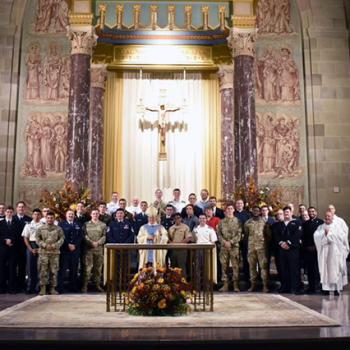In recent days, the Rev. Dr. Jeremiah Wright has been back in the news, as a Republican super-PAC threatened to spend millions of dollars airing commercials about the link between Mr. Wright and President Barack Obama. The former pastor of President Obama's former church in Chicago, the Rev. Wright shot to national prominence during the 2008 election when his radical and—to many—anti-American sermons were broadcast to the nation, sound bite by sound bite.
As you may remember, in a sermon just after 9/11, Mr. Wright preached that the terrorist attack was a result of America's sins against justice, and that "America's chickens are coming home to roost." In his widely-quoted "God damn America" sermon (actual title: "Confusing God and Government"), given as the nation went to war with Iraq in 2003, the Rev. Wright argued that the war was wrong, and that America was wrong for undertaking it—particularly if the nation believed that God blessed it for doing so.
As you will probably remember, Mr. Obama was forced to distance himself from some of the more incendiary rhetoric of his pastor, and finally repudiated him publicly. In this current news cycle, the president will have to continue to deny his former pastor, to charge him with bringing a message of hate and conspiracy that most Americans can't hear without outrage.
He'll have to do so because although Mitt Romney and Speaker of the House John Boehner have said that the economy is a more useful topic than the president's association with Mr. Wright, the message still gets out. When Speaker Boehner declares, "The issue is not Reverend Wright," he still keeps Mr. Wright in the news. (It is like those Democratic talking heads who announce that they do not intend to talk about the fact that Mr. Romney is a Mormon.)
And though the leaders get to seem honorable, on the talk shows, radio, et. al., where the Republican dirty work gets done, the Rev. Wright remains a hot topic. Sean Hannity, who promised in 2008 to talk about the pastor until the entire world knew how dangerous he was, has picked him up again. On a recent show, Mr. Hannity sang the old refrain: "I believe that the president's relationship with the Reverend Jeremiah Wright, a man that influenced him for over 20 years, inspired him, is a very important campaign issue. After all, it is a matter of character."
So if Mr. Obama is to be perceived as someone with a properly American character, the Rev. Wright will have to be thrown under the bus again. But while I don't resonate with the pastor's method of expression—no one listens to angry voices express ideas counter to their own—I wish people would recognize the Rev. Wright as a prophetic voice calling America to a more faithful citizenship.
Mr. Wright has not been misrepresented in the media—the sound bites, while shocking, are true to his method and his message.
It's not so much that he's been misunderstood. It's that we do not wish to understand him.
In a more Biblically-literate and historically-acute nation, it would not be necessary to disown Jeremiah Wright. It would be possible for us to hear him and his message not as anti-American and hate-filled, but as prophetic. His voice and others like his are calling America to be just and moral and aware that while it holds great power, America is not God.
The Rev. Wright became infamous for those angry sermons in which he called America to task for its moral failures—for its treatment of Native Americans and African Americans, for the internment of Japanese Americans during World War Two, for all the myriad ways in which America—despite its self-identification as a Christian nation—has been decidedly unchristian in its approach to peace, justice, and economic equity.
I am here today to testify that Jeremiah Wright was often both offensive and—theologically, biblically, doctrinally—right.
You see, there is a word for this type of angry sermon, one of the oldest and most-respected kinds of discourse in Jewish and Christian life: such sermons are called jeremiads, and are named after the temple sermon of the Rev. Wright's namesake, the prophet Jeremiah. In Jeremiah, Chapter 7, the prophet takes his nation to task for its many failures—and for its continued insistence on thinking itself holy and chosen because it conform to some outward features of religion:





